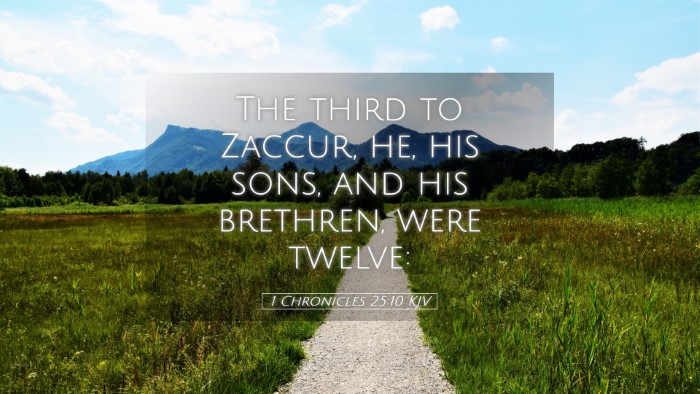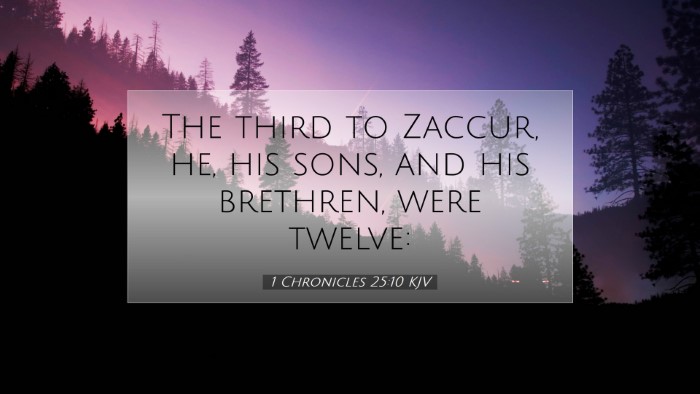Commentary on 1 Chronicles 25:10
Verse Text: "And the third, Zaccur, his sons and his brethren, were twelve." (1 Chronicles 25:10)
Introduction
The genealogy and organization of the Levitical singers and musicians in 1 Chronicles 25 serve a significant purpose within the broader narrative of worship in ancient Israel. This verse mentions Zaccur, signaling a continuation of the priestly line and their associated duties. Understanding this context is essential for pastors and scholars to appreciate the value placed on divinely appointed roles in worship.
Contextual Significance
This chapter details the divisions of the musicians who were appointed by David, emphasizing the importance of worship in the life of Israel. David, as a man after God's own heart, recognized the centrality of music and praise in the tabernacle's service.
Insights from Matthew Henry
Matthew Henry notes that this chapter enumerates the singers and their assignments under King David, highlighting that worship was not a mere personal endeavor but an organized, communal activity. He emphasizes the notion that the appointment of singers reflects God's desire for order in worship.
- The Role of Musicians: Musicians in Israel were seen as vital contributors to the worship experience, and their numbers included both gifted individuals and those who were parts of a family line, symbolizing continuity in worship leadership.
- Sovereign Selection: Henry stresses that God's sovereignty is evident in selecting not only the leaders but also their descendants for service, suggesting that worship leading is a sacred trust passed down.
Observations by Albert Barnes
Albert Barnes emphasizes the organizational structure of the temple service. He interprets the specifics of clan divisions as essential in maintaining a rhythm in worship, fostering a sense of community and belonging.
- Clanship and Worship: Barnes remarks that the detailed list of families and their roles affirms the importance of heritage in bringing about corporate worship, illustrating how communal identity plays a crucial role.
- Symbolism of Numbers: He highlights the number twelve as symbolically significant, often representing completeness and divine order, signifying that God's design for worship involves a community working harmoniously.
Reflections by Adam Clarke
Adam Clarke provides an extensive analysis of the practical implications of this verse. He suggests that the precision in listing names points to the intentionality behind worship practices in Israel.
- Importance of Education: Clarke argues that musicians were likely trained in the art of music, pointing to the necessity of excellence in the representations of their worship, encouraging modern worship leaders to pursue mastery in their craft.
- Encouragement of Active Participation: He encourages current believers to see the importance of active roles in their church music ministries, echoing the ancient practices by encouraging contemporary involvement in worship leading.
Theological Implications
This verse invites reflection on the theology of worship. The generational significance in God’s plan underlines the covenantal nature of worship practices, where each generation is given a role in the continuation of sacred traditions.
- Covenantal Worship: Each name listed represents more than a function; it symbolizes participation in God’s ongoing covenant with His people, reminding current believers of their inherited responsibility to uphold and innovate in worship.
- The Role of Music in Worship: The centrality of music highlights its power to engage the heart, mind, and spirit of worshippers, reinforcing the notion that worship is a multi-faceted experience requiring distinct gifts.
Conclusion
The details surrounding Zaccur and his lineage in 1 Chronicles 25:10 may seem to present a simple historical record, yet they offer profound insights into God's design for worship through appointed roles and structured communities. As pastors, theologians, and students delve into these passages, they uncover the layers of meaning that inform contemporary worship practices, urging a commitment to collective praise grounded in scriptural foundations.


